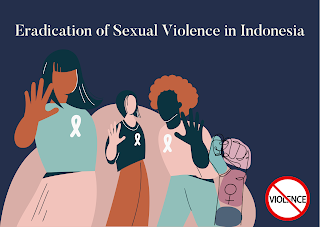Eradication of Sexual Violence in Indonesia
March 15, 2022
The National Commission on Violence Against Women (Komnas Perempuan) released a report in 2019 that revealed Indonesia's rising rate of sexual violence. The commission had received 4,500 reports of violence against women during the January - October 2021 period. In comparison to 2020, the figure shows that the number of reports has doubled. The report also recorded a 14 percent increase in cases of violence against women to a total of 406,178 cases.Those are red flags and we need to stop sexual violence against women now! (Sagala, 2020).
The government has always been committed to ending sexual violence and has never given up. The Law on the Elimination of Domestic Violence, the Law on the Crime of Human Trafficking, and the Law on Child Protection are just a few of the rules that have been established. Bintang Puspayoga, Minister of Women's Empowerment and Child Protection (PPPA), stated that while various laws have been passed, the legal structure in place is not yet systematic and comprehensive enough to prevent, protect, rehabilitate, and empower survivors of sexual abuse, so The Sexual Violence Eradication Bill should be ratified as soon as possible in order to close and correct these gaps. As a result, we can defend our country by establishing a system of prevention, recovery, treatment, and rehabilitation that may truly abolish sexual violence.
First, the bill will create a legal definition of sexual violence. One sort of sexual assault listed in the law is sexual exploitation, in which perpetrators use lies, seduction, promises to marry the victim, and training the victim to be in a subordinate position to lure victims in. According to the bill, the lies or compulsion constitute a kind of sexual violence in such situations, despite the apparent giving of permission (Marpaung, 2022).
Meanwhile, the Sexual Violence Eradication Law will offer pro-victim legal solution. The Elimination of Sexual Violence Bill is a problem for women and children, but it also affects all parties' interests. Defending women's and children's rights entails preventing the country from collapsing. Protecting women and children from sexual violence is a long-term battle that must be waged, and KPPG is no different. The Panja is currently discussing the Elimination of Sexual Violence Bill, which, of course, aims to defend women and children. "We women can contribute ideas and proposals so that the law can be enacted later," Airin remarked.
Victims of sexual violence are expected to study the academic version of the text, and the bill supports the academic bill because it is also implied in schools and universities. In Indonesia, there are numerous cases of violence, particularly among women who are still in school or in college. This necessitates the creation of academic texts to combat sexual violence, which has negative effects for the Indonesian nation's future generations. A comprehensive theoretical study of empirical practice to form a framework for the bill's urgency, evaluation and analysis of applicable laws and regulations related to sexual violence, and finally a strong philosophical, juridical, and juridical. Sociological basis as the bill's basis are all required from the academic text (Chandra, 2021).
Finally, the Human Rights Law and our Constitution underline the state's commitment to ensure everyone's freedom from fear and prejudice. In accordance with this, the bill should at the very least include elements of victim prevention, treatment, protection, and counseling, as well as punishment for perpetrators, all of which are framed as a form of state presence in the fight against sexual violence and the protection of victims' rights. Sexual harassment, sexual exploitation, contraceptive coercion, abortion coercion, rape, forced marriage, forced prostitution, sexual slavery, and sexual torture are all sorts of sexual violence that should be addressed by the bill.
So, what is the best way to end sexual violence against women in Indonesia? The ideal strategy is to undertake policy audits pertaining to human rights, gender equality, and social inclusion of all rules and policies in Indonesia. There needs to be a greater push for Indonesia to demonstrate its commitment to human rights and women's rights by respecting, protecting, and fulfilling them. To allow inclusive legislation and policies, a strong knowledge ecosystem and stakeholder participation are essential (Pandu & Adji, 2022).
References:
Chandra, G. (2021). Nadiem Makarim: Sexual Violence on Indonesian Campuses Is a Critical Emergency. Jakarta Globe.
Marpaung, J. (2022). Sexual Violence Eradiction in Indonesia: The Road Ahead. Jakarta Globe.
https://jakartaglobe.id/opinion/sexual-violence-eradication-in-indonesia-the-road-ahead
Pandu, R. & Adji, R. (2022). Indonesian Government’s Commitment to Sexual Violence Bill. Antara News.
https://en.antaranews.com/news/215329/indonesian-governments-commitment-to-sexual-violence-bill
Sagala,
R. (2020). ‘Difficulties’ Surrounding Sexual Violence Eradication Bill. The
Jakarta Post.



Comments
Post a Comment